Catholic Ethical Purchasing Alliance Hosts Immersion at Ethical Textile Production Cooperative
ISN Staff | October 2, 2023
In August 2023, there will be a new date. Catholic Ethical Purchasing Alliance (CEPA) gathered institutional leaders from Catholic high schools and universities and secular workers’ rights organizations in Morganton, North Carolina, at The Industrial Commons Two-day immersions were held to allow participants to consider the impact of their purchasing practices on both their institution and society. Institutions represented were the University of Dayton, Cardinal Gibbons High School, Bishop O’Dowd High School, the Garment Worker CenterAnd the Sweatfree Purchasing Consortium.
The Industrial Commons is a cooperative ecosystem of businesses and organizations working to build a more just garment industry by centering workers’ rights, living wages, and sustainability throughout the production process. As a result of these commitments, they have been key CEPA Partners as the Alliance provides support to institutions seeking to integrate the values of sustainability and workers’ rights into their purchasing decisions.
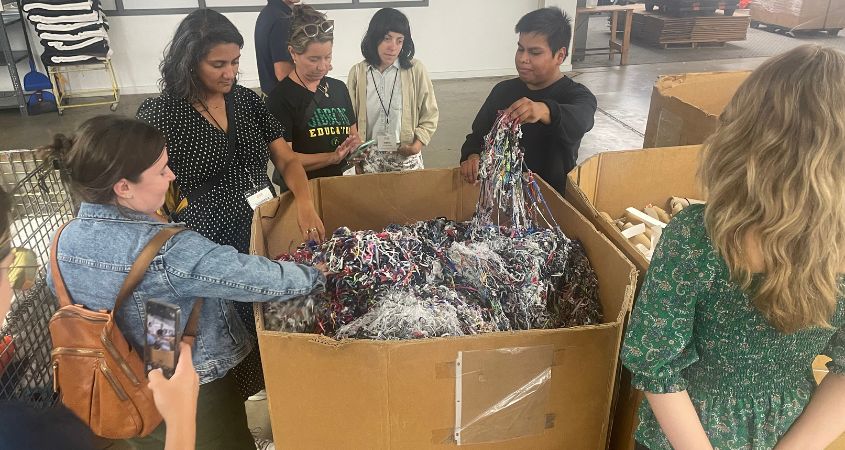
Participants examine a collection of fabric remnants that will go to Material Return and be transformed into a new yarn used to make beanies or socks!
Participants had the chance to visit facilities and meet key partners within the ethical clothing manufacturing industry. They began at Carolina Textile District, a network of textile manufacturers aligned with values in North Carolina and South Carolina, governed by members and driven by them. The participants then took a tour. Opportunity ThreadsA worker-owned cooperative cut and sew factory, operated primarily by migrants from Guatemala. They now own and run the facility under the cooperative model.
The next tour was with Material ReturnMaterial Return is a model of a circular economy, which is an economic system based on the reuse and recycling of materials. Material Return is a model for a circular economy. This economic system is based upon the reuse and regeneration Material or product recycling is a way to continue production in an environmentally friendly manner. At Material Return fabrics and threads would have otherwise gone to waste, but are now used to make new products such beanies and hosiery. This circularity model benefits the local economy, workers, and clients with values aligned.
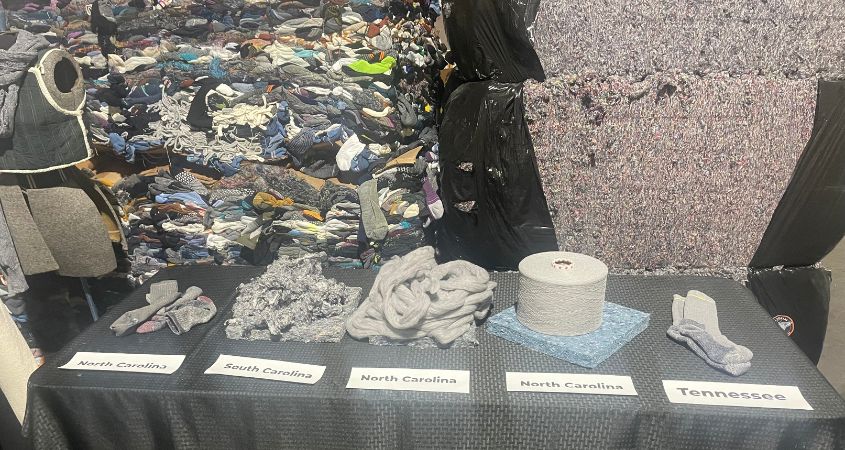
Demonstration of how Material Return uses old socks to make new socks. This process is carried out locally to reduce emissions.
After a day of tours of The Industrial Commons, in Morganton participants then traveled to Burlington (North Carolina) to visit a Carolina Textile District partner. TS DesignThe company focuses on low carbon emissions and corporate responsibility, as well as local sourcing. Using The triple bottom line business model is based on three equally important bottomlines: Peoples, Planet, and Profits. Eric Henry, the founder and president at TS Designs has created a tee shirt that is transparent from the cotton’s growing to the printing and dyeing process. He and his organisation know who made it, and the impact it had on planet at every step.
CEPA’s partnered schools are already seeing the impact of apparel made with this transparent and ethical production process. Participants were at TS Designs looking at a box full of t-shirts. Sarah Richard, the student engagement coordinator, was there to help. Hanley Sustainability Institute, University of DaytonTS Designs, who made the shirt for her university, had a replica of it.
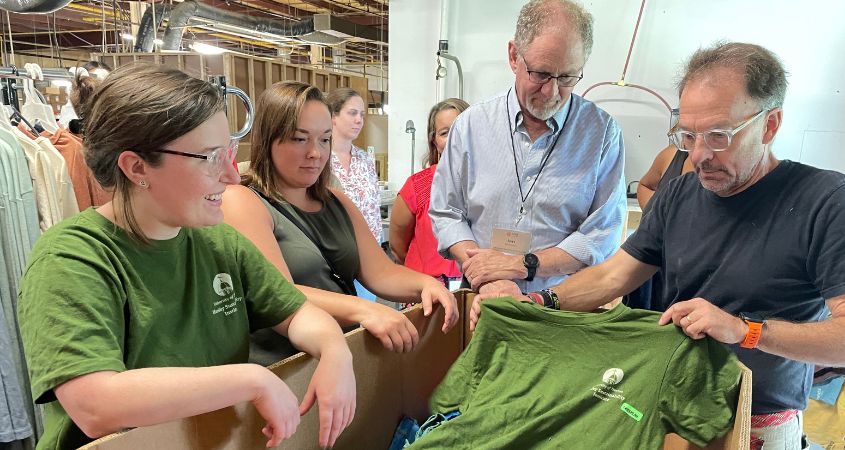
Sarah Richard, student involvement coordinator at Hanley Sustainability Institute, University of Dayton finds a replica of the tee shirt she is wearing. It was made by TS Designs for her university.
The immersion provided an opportunity for leaders of ethical purchasing in Catholic institutions to come together and learn more about how clothing is made and ways that individuals and institutions could make purchasing decisions in alignment with protecting workers’ rights and dignity and the planet.
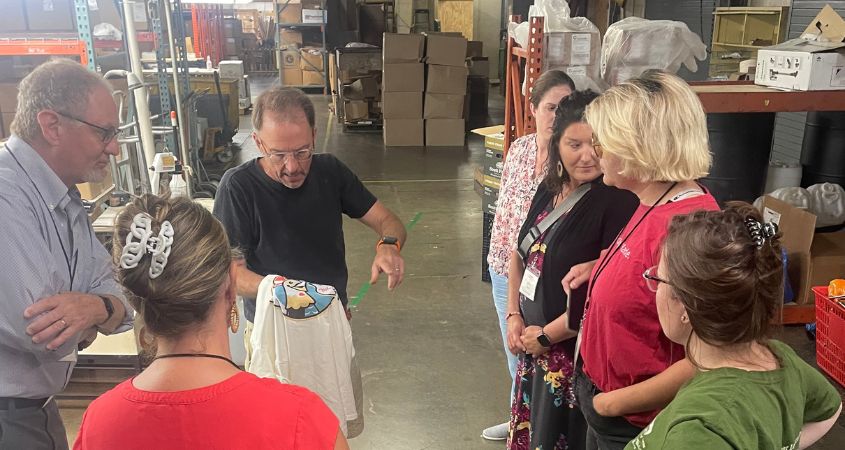
Participants will meet Eric Henry, President of TS Designs and tour the screen-printing and dyeing facility he uses for tee-shirts. Henry has implemented sustainable methods for printing and dyeing t-shirts. He’s also working on a North Carolina-made tee shirt, which will be made in the state.
When asked about the impact of the immersion overall, Richard reflected, “I really enjoyed the opportunity to see firsthand an example of what’s possible. In the classroom, we often talk about the issues in our supply chain and while we present the theory of change, to be able to meet the people waking up and doing this work every day, is quite inspiring.”
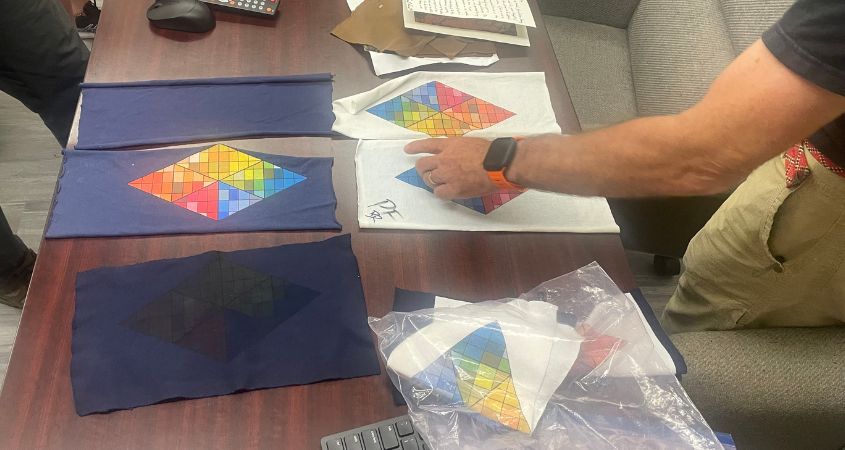
Henry discusses the ongoing efforts TS Designs makes to develop a dyeing and print process that is more sustainable and efficient.
“The mini-immersion provided an opportunity for leaders in various institutions to come together and find ways to create a path for a more ethical purchasing model in their institutions,” said Grace Adams, Catholic Ethical Purchasing Alliance coordinator. “We were lucky to have representatives from Catholic high schools, the University of Dayton—our first CEPA university—, and leaders within this work at the Garment Workers Center and the Sweatfree Purchasing Consortium present to learn about ways our institutions can honor the dignity of workers and the earth through purchasing policies and decisions.”